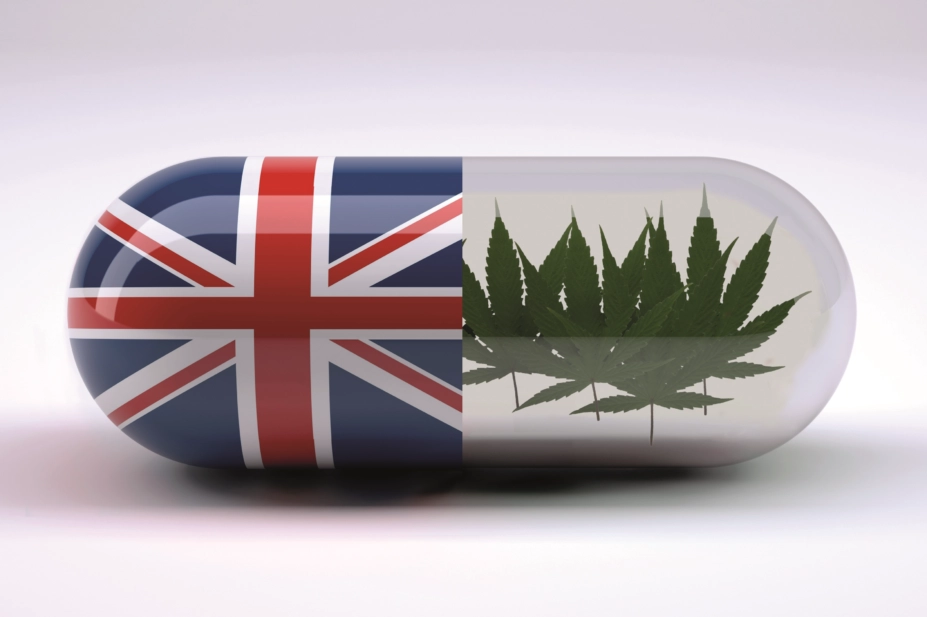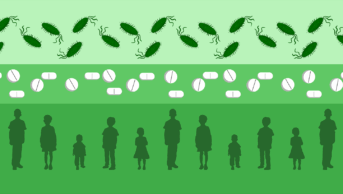
Shutterstock.com
Medical cannabis was legalised in the UK on 1 November 2018, but the regulations around its use and supply remain strict. Here is a quick update about how it is being used in the NHS and what benefits it may or may not offer.
What is now legal?
The term ‘medical cannabis’ refers to unlicensed, cannabis-based products formulated for medical use in humans (CBPMs). It is quite distinct from cannabis used for recreational purposes, which remains illegal, and this is not likely to change soon. The Misuse of Drugs (Amendments) (Cannabis and Licence Fees) (England, Wales and Scotland) Regulations 2018 state that: “A person shall not self-administer a cannabis-based product for medicinal use in humans by the smoking of the product.”
Currently, Sativex is the only cannabis-based medical product licensed by the Medicines and Healthcare products Regulatory Agency (MHRA). It is licensed for the treatment of multiple sclerosis (MS), but it is not considered a CBPM. The MHRA’s guidance on cannabis-based products, ‘The supply, manufacture, importation and distribution of unlicensed cannabis-based products for medicinal use in humans “specials”’ specifically exempts it because it is not an unlicensed medicine.
What are CBPMs used for?
In the UK, all CBPMs are unlicensed and can only prescribed on a case-by-case basis by physicians listed on a specialist General Medical Council register. In October 2018, NHS England said that CBPMs should only be prescribed if there is “clear published evidence of benefit or UK guidelines” and that CBPMs should only be considered when all other options have been exhausted.
The National Institute for Health and Care Excellence (NICE) is developing final guidance, which is expected to be published around October 2019. However, in 2018, NHS England also asked three bodies to develop interim guidance for the use of medical cannabis: the British Paediatric Neurology Association on use of medical cannabis in children and young people with rare, severe forms of epilepsy; the Royal College of Physicians on its use in chemotherapy-induced nausea as well as vomiting, chronic pain and pain in palliative care patients; and the Association of British Neurologists on its use in adults with neurological conditions, including MS.
The strongest existing evidence supporting the use of medical cannabis appears to be for its treatment of intractable seizures in two severe forms of childhood epilepsy, Dravet and Lennox-Gastaut syndrome; chemotherapy-induced nausea and vomiting; improving symptoms in MS and treating chronic pain in adults. However, there are concerns about the quality of this evidence.
Does medical cannabis work?
Many users of medical cannabis would argue strongly that it is effective. However, there have been very few randomised controlled trials (RCTs) on cannabis-based medical products. Dame Sally Davies, chief medical officer for England, is among those who have called on the pharmaceutical industry to do more RCTs on medical cannabis. Although the National Institute for Health Research has offered dedicated funding for clinical research into cannabis-based products for medical use, Davies has said that funding trials “can’t be just left to the public sector”.
There is a point where multiple anecdotal stories do actually build up to a pattern of evidence
However, Peter Carroll, director of End Our Pain, which campaigns for access to medical cannabis, says that although RCTs are “the gold standard … there is a point where multiple anecdotal stories do actually build up to a pattern of evidence”.
What are the side effects of medical cannabis?
Guidance from the Royal College of General Practitioners (RCGP), published on 17 December 2018, says that cannabis can “exacerbate symptoms of psychosis in individuals who are schizophrenic, or have a family history of schizophrenia or other psychosis”.
Although it says there is as yet no verified evidence of a direct causal link between cannabis use and psychosis, it cautions doctors to bear this in mind of when working when patients who do have a psychotic condition, or a family history of psychosis.
The RCGP also pointed out the short-term side effects of medical cannabis use, including “dizziness, euphoria, drowsiness, dry mouth, confusion, disorientation, somnolence, balance problems, hallucinations, paranoia and fatigue”.
What about the cannabis oils I see in health food shops?
The major pharmacologically active compounds of Cannabis sativa are cannabidiol (CBD) and tetrahydrocannabinol (THC). Unlike THC, pure CBD is not psychoactive and is not a controlled substance.
The CBD oils that are on sale at time of publication contain low concentrations of CBD and are marketed as food supplements, not medical products. However, it is difficult to purify CBD from plants to the point that no trace of THC remains. The MHRA has said that if a CBD product “contains any controlled cannabinoids, unintentionally or otherwise … then it is highly likely that the product would be controlled” under the Misuse of Drugs regulations, and advises caution.
The Royal Pharmaceutical Society advises pharmacists considering stocking these products to obtain assurance from the manufacturer as to how much CBD and THC the products contain. The RPS has produced a quick reference guide to CBD oil, and how it differs from full-extract cannabis oils.
The Food Standards Agency will clarify how to achieve compliance in the marketplace in a proportionate manner
Changes to the EU “Novel Food Catalogue” in March 2019 could affect the sale of some CBD products. These changes mean that the EU now considers CBD-containing foods and food supplements ‘novel foods’ — i.e. foods without a significant history of consumption. As a result, the Food Standards Agency (FSA) in the UK says these products will need to be evaluated and authorised before going on sale. On its website, the FSA says it is seeking to “clarify how to achieve compliance in the marketplace in a proportionate manner”.
Consider, too, that CBD has the potential to interact with some medicines. The Specialist Pharmacy Service has issued guidance on potential adverse effects and drug interactions.
Why is there still such a lack of prescriptions for medical cannabis?
Despite the legislative change, it has proven difficult to obtain a prescription for medical cannabis on the NHS. Not long after it was rescheduled, the NHS said that “very few people in England are likely to get a prescription for medical cannabis”, adding that it would only be considered if other treatments had failed to offer relief.
On 20 May 2019, Seema Kennedy, the public health minister, said that six NHS prescriptions had been issued in the community since November 2018, with ten private prescriptions issued from January 2019 to February 2019. These figures came from the NHS Business Services Authority, which collects data on primary care, so it is possible that more prescriptions were issued in secondary care, but that information has not been published.
A lack of familiarity with medical cannabis has been cited as one reason why clinicians may be reluctant to prescribe it, as has a lack of RCTs (and, hence, a lack of robust clinical evidence). Matt Hancock, secretary of state for health and social care, has asked NHS England to “rapidly” evaluate NHS prescribing of CBPMs to “address barriers to clinically appropriate prescribing”. NHS England was expected to present their report to Hancock around the end of May 2019.
Key quotes
“Having been moved by heartbreaking cases involving sick children, it was important to me that we took swift action to help those who can benefit from medicinal cannabis.” Sajid Javid, home secretary.
“The product is available in this country, perfectly legally, to those who can afford it, and that sticks strongly in my throat.” Mike Penning, Conservative MP for Hemel Hempstead.
“We need better guidance for doctors and pharmacists, more comprehensive education and a bit of common sense. Yes, we do need more study evidence, but we should be prescribing this safe and widely used medicine while we are learning more about its properties”. Mike Barnes, consultant neurologist and honorary professor of neurological rehabilitation, Newcastle University.
“If manufacturers of any cannabis-related products would like it to be used for medical use, they should be prepared to go through the normal development process and there should be trials of efficacy — at the moment, a lot of the evidence is either anecdotal or very poorly designed.” Roger Knaggs, associate professor, Faculty of Science, University of Nottingham and member of the Advisory Council on the Misuse of Drugs.
Important dates
- 19 June 2018: The UK government announces a review into whether medical cannabis should be rescheduled;
- 3 July 2018: The first part of review is published, with the recommendation that cannabis-based medicinal products be moved to Schedule 2;
- 19 July 2018: The second part of review is published, which also recommends rescheduling and asks for a clear definition of cannabis-derived medicinal products, and for clinical guidance into their use;
- 26 July 2018: The UK government announces that specialist clinicians will be able to legally prescribe cannabis-derived medicinal products by the autumn of 2018;
- 1 November 2018: Medical cannabis becomes legal in the UK;
- 21 October 2019: The projected date for the National Institute for Health and Care Excellence’s guideline on medical cannabis.
Further reading
- Medicines and Healthcare products Regulatory Agency guidance on the supply of unlicensed cannabis-based products for medicinal use in humans
- Royal Pharmaceutical Society quick reference guide to cannabis oils and cannabidiol oils: What are they and what are the differences?
- NHS guidance to clinicians: Cannabis-based products for medicinal use
- British Paediatric Neurology Association guidance on the use of cannabisâ€based products for medicinal use in children and young people with epilepsy
- Royal College of Physician’s recommendations on cannabis-based products for medicinal use https://www.rcplondon.ac.uk/projects/outputs/recommendations-cannabis-based-products-medicinal-use
- Recommendations and Guidance on Medical Cannabis under Prescription, developed by the Medical Cannabis Clinicians Society and the All Party Parliamentary Group for Medical Cannabis under Prescription


